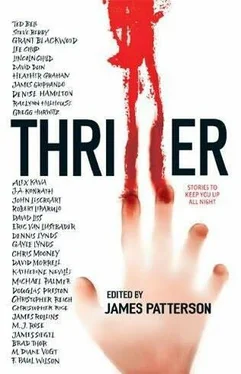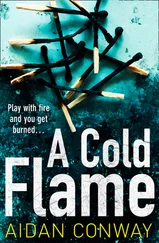Kate bolted from the room. Halfway down the steps she lost her balance. The hardwood floor at the foot of the stairs rose up to meet her face. The impact knocked the wind out of her. She lifted herself up onto all fours. A shadow dimmed the strips of leaded glass on either side of the front door. Keys rattled against the lock outside. "Kate," her mother said quietly and firmly. Kate could hear the challenge in her mother's voice. Maybe if she just let her explain. Maybe she could understand. Maybe then she wouldn't have to risk her own life for a father who was guilty of the indiscretions she had just accused her boyfriend of.
As soon as a crack of light appeared around the edge of the front door, Kate rose to her knees and hurled the front door shut, heard her father let out a surprised grunt. Steeling herself for the gunshot she was sure would come next, Kate dropped to the hardwood floor.
"Well," her mother said quietly. "It looks like you've made your choice."
Kate heard the door to the master bedroom close. Then there was a quick sharp sound that Kate couldn't place. A movie sound. Her mind groped to give it a word. Silencer.
By then, Kate's father was standing over her, his jacket slung over one arm and his tie loose, his head cocked to one side like a puppy as he tried to make sense of the scene before him and the strange sound that had just come from his bedroom.
Kate didn't explain any of it for him. She let him go upstairs and discover the scene for himself, just as her mother had intended.
When Alex Kava wrote her first novel, A Perfect Evil, she had no intention of making it the beginning of a new series. In fact, the character, FBI profiler Special Agent Maggie O'Dell doesn't enter the story until the seventh chapter. Instead of a series, Kava had simply based her story on two separate crimes that had occurred in Nebraska during the 1980s. One of the crimes, a serial killer who preyed on little boys, happened in the community where Kava was then working as a copy editor and paste-up artist for a small-town newspaper.
Years later, when Kava decided to write a novel, it was the same summer John Joubert-who thirteen years earlier had confessed to and was convicted for killing three little boys- was executed. The other crime, another little boy who was murdered in nearby Omaha several years after Joubert's capture, remains unsolved to this day. These two real-life crimes inspired Kava. However, because of A Perfect Evil and Maggie O'Dell's international success, Kava was compelled to develop a series. The results are four more novels featuring Special Agent Maggie O'Dell: Split Second, The Soul Catcher, At the Stroke of Madness and A Necessary Evil. Her one standalone thriller, One False Move, is also loosely based on a real crime.
Kava believes that truth is, indeed, stranger than fiction, which seems to be reiterated every time she begins research for a novel. One aspect of the Maggie O'Dell series that readers often comment on is the relationship between Maggie and her mother. It can best be described as challenging and confrontational, and definitely a far cry from what we perceive as a typical mother-daughter relationship. And yet, just like in real life there remains a bond, though sometimes unex-plainable and often irrational. Here, in Goodnight, Sweet Mother, Kava takes Maggie and her mother on a road trip to illustrate that relationships, as well as perceptions, aren't always what they appear to be.
Maggie O'Dell knew this road trip with her mother was a mistake long before she heard the sickening scrape of metal grinding against metal, before she smelled the burning rubber of skidding tires.
Hours earlier she had declared it a mistake even as she slid into a cracked red vinyl booth in a place called Freddie's Dine- actually Diner if you counted the faded area where an "r" had once been. The diner wasn't a part of the mistake. It didn't bother her eating in places that couldn't afford to replace an "r." After all, she had gobbled cheeseburgers in autopsy suites and had enjoyed deli sandwiches in an abandoned rock quarry while surrounded by barrels stuffed with dead bodies. No, the little diner could actually be called quaint.
Maggie had stared at a piece of apple pie a la mode the waitress had plopped down in front of her before splashing more coffee into her and her mom's cups. The pie had looked perfectly fine and even smelled freshly baked, served warm so that the ice cream had begun to melt and trickle off the edges. The pie hadn't been the mistake either, although without much effort Maggie had too easily envisioned blood instead of ice cream dripping down onto the white bone china plate. She had to take a sip of water, close her eyes and steady herself before opening her eyes again to ice cream instead of blood.
No, the real mistake had been that Maggie didn't order the pie. Her mother had. Forcing Maggie, once again, to wonder if Kathleen O'Dell was simply insensitive or if she honestly did not remember the incident that could trigger her daughter's sudden uncontrollable nausea. How could she not remember one of the few times Maggie had shared something from her life as an FBI profiler? Of course, that incident had been several years ago and back then her mother had been drinking Jack Daniel's in tumblers instead of shot glasses, goading Maggie into arresting her if she didn't like it. Maggie remembered all too vividly what she had told her mother. She told her she didn't waste time arresting suicidal alcoholics. She should have stopped there, but didn't. Instead, she ended up pulling out and tossing onto her mother's glass-top coffee table Poloraids from the crime scene she had just left.
"This is what I do for a living," she had told her mother, as if the woman needed a shocking reminder. And Maggie remembered purposely dropping the last, most brilliant one on top of the pile, the photo a close-up of a container left on the victim's kitchen counter. Maggie would never forget that plastic take-out container, nor its contents-a perfect piece of apple pie with the victim's bloody spleen neatly arranged on top.
That her mother had chosen to forget or block it out shouldn't surprise Maggie. The one survival tactic the woman possessed was her strong sense of denial, her ability to pretend certain incidents had simply not happened. How else could she explain letting her twelve-year-old daughter fend for herself while she stumbled home drunk each night, bringing along the stranger who had supplied her for that particular night? It wasn't until one of Kathleen O'Dell's gentleman friends suggested a threesome with mother, daughter and himself that it occurred to her mother to get a hotel room. Maggie had had to learn at an early age to take care of herself. She had grown up alone, and only now, years after her divorce, did she realize she associated being alone with being safe.
But her mother had come a long way since then, or so Maggie had believed. That was before this road trip, before she had ordered the piece of apple pie. Perhaps Maggie should see it for what it was-the perfect microcosm of their relationship, a relationship that should never include road trips or the mere opportunity for sharing a piece of pie at a quaint little diner.
She had watched as her mother sipped coffee in between swiping up bites of her own pie. As an FBI criminal profiler, Maggie O'Dell tracked killers for a living, and yet a simple outing with her mother could conjure up images of a serial killer's leftover surprises tucked away in take-out containers. Just another day at the office. She supposed she wasn't as good as her mother at denial, but that wasn't necessarily a bad thing.
Suddenly Kathleen O'Dell had pointed her fork at something over Maggie's shoulder, unable to speak because, of course, it was impolite to talk with a full mouth-never mind that during her brief and rare lapses into motherhood she constantly preached it was also impolite to point. Maggie didn't budge, ignoring her, which was also silly if she thought it would in any way punish her mother for her earlier insensitivity. Besides it had only resulted in a more significant poke at the air from her mother's fork.
Читать дальше












